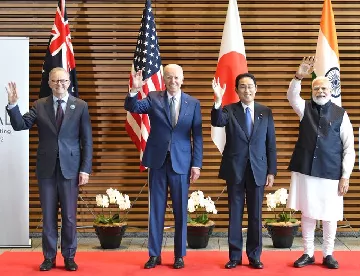Without referring to Russia and China, Prime Minister Narendra Modi in his opening remarks at the QUAD summit in Tokyo has called for an “inclusive” Indo-Pacific which was a “force for the good” in the international system.
Adopting a benign tone and a positive tenor marked with his trademark enthusiasm, PM Modi said: "At the Quad level, with our mutual cooperation, a free, open and inclusive Indo Pacific Region is getting encouraged – it is the shared goal of all of us."
My remarks at the Quad Leaders Meeting in Tokyo. https://t.co/WzN5lC8J4v
— Narendra Modi (@narendramodi) May 24, 2022
India, the United States, Japan and Australia comprise the QUAD—a defensive grouping of four democracies, which seeks to collectively safeguard a rule-based order in the Indo-Pacific that has been threatened by China’s naval assertiveness in regional waters. Following the Covid-19 pandemic, the grouping is looking for establishing resilient supply chains that do not over-rely on China.
On Tuesday, all the QUAD countries joined Indo-Pacific Economic Framework (IPEF) for Prosperity, a 13-nation grouping that could provide an alternative to the China-led Regional Comprehensive Economic Partnership (RCEP).
Took part in the programme to launch of the Indo-Pacific Economic Framework (IPEF), which will play a key role in furthering growth in the Indo-Pacific region. pic.twitter.com/IbJ372I7SX
— Narendra Modi (@narendramodi) May 23, 2022
PM Modi noted that QUAD has energised and enthused “democratic powers”.
He pointed out that despite the difficult circumstances of COVID-19, the member states have stepped up coordination in several areas like vaccine delivery, climate action, supply change resilience, disaster management and economic cooperation. "It has ensured peace, prosperity and stability in the Indo-Pacific," he added.
The Prime Minister specially congratulated the new Australian Premier Anthony Albanese for winning the elections, and for participation in the QUAD summit. "Your presence amongst us 24 hours after taking the oath reflects the strength of Quad friendship and your commitment towards it," he observed.
Like India, Albanese too steered clear of referring to the war in Ukraine and China driven tensions in the South China sea.
"The new Australian government's priorities align with the Quad agenda, taking action on climate change, and building a stronger and more resilient Indo-Pacific region through better economic security, better cyber security, better energy security and better environmental-and-health security," the new Australian Prime Minister.
But US President Joe Biden went ballistic to blame Russia and Russian President Vladimir Putin in his opening remarks.
Also Read: US includes India, Japan in new 13-nation Indo-Pacific economic group to counter China
The US President said that the world is "navigating a dark hour in our shared history," in reference to the Ukraine war. Taking on the Russian President personally, Biden blamed him for targeting Ukrainian culture and triggering a global food crisis. “Putin is just trying to extinguish a culture. This is more than just a European issue, it's a global issue. Global food crisis may worsen by Russia blocking Ukraine from exporting its grains,” the US president noted. Biden’s remarks also stood out for excluding any direct reference to China, whose belligerence in the region had provided the cement for the QUAD to bond.
The US president was also seen going out his way to greet the new prime minister who belongs to Australia’s labour party, which, in the past has been soft on China. For the US, any deviation from the hard-line stance on China adopted by the former Australian Premier Scott Morrison, could undermine AUKUS—an anti-China security grouping comprising Australia, the United Kingdom and the US.
Underlining a differential approach among QUAD members, Japanese Prime Minister Fumio Kishida also hit out at the Russian invasion of Ukraine. "Since we last met in person in September, an incident that overturns the rules-based international order has happened: the Russian invasion of Ukraine," Kishida said in introductory remarks. "It is a blatant challenge to the conditions set in the United Nations charter. We must not allow the same thing to happen in the Indo-Pacific."
The Japanese are worried that Russia’s action sets a precedent that can encourage China to take over the disputed Senkaku islands in the East China Sea as well as Taiwan, which would significantly undermine Japanese security.
Also Read: Citing ancient port of Lothal, PM Modi says India has been the centre of Indo-Pacific trade




















